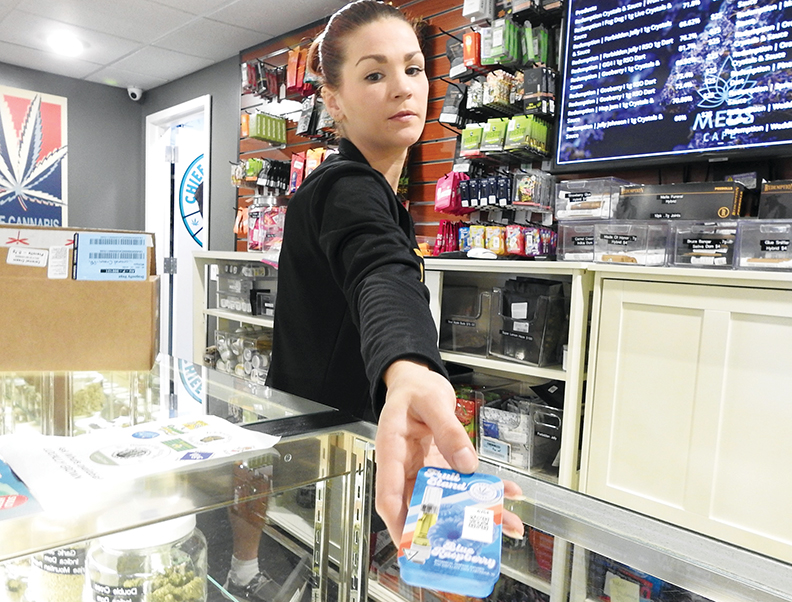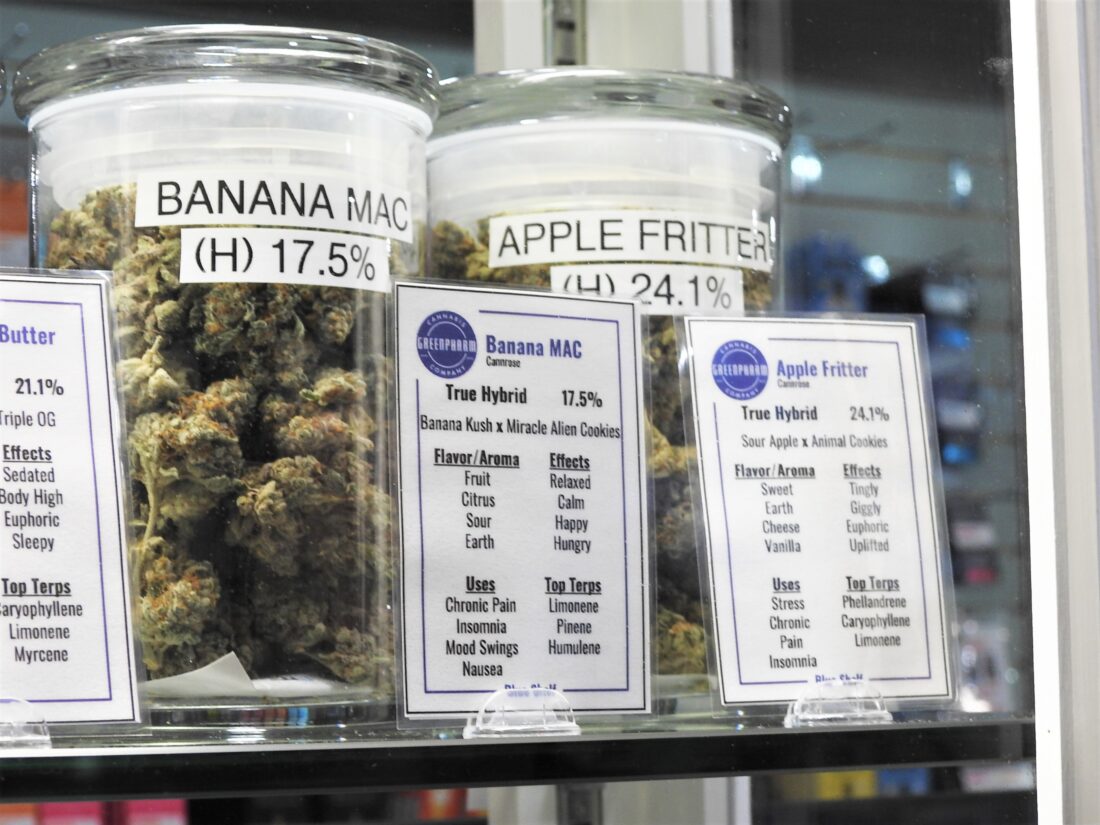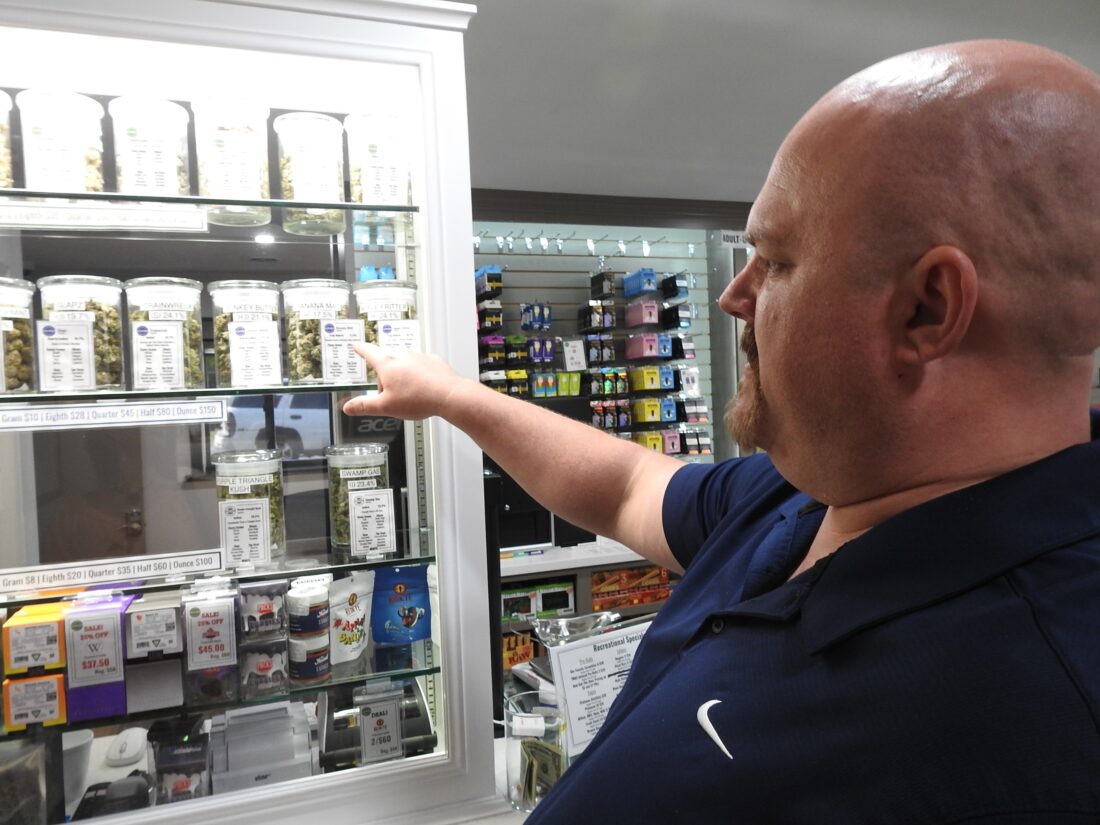WITH VIDEO: Cannabis promises opportunity, challenges for Northeast Michigan

News Photo by Julie Riddle Autumn Darga, budtender at Meds Cafe near Rogers City, displays products at the store in September.
ALPENA — The introduction of six cannabis shops in the past three years means Northeast Michigan residents have ready access to a substance some fear and others say protects people’s mental and physical health.
The marijuana businesses have drawn about $340,000 in tax dollars into the region, with the promise of hundreds of thousands more as more shops open and sales soar.
Government officials say some of that money could help offset the feared potential negatives of marijuana legalization, such as more use of methamphetamine and other illicit drugs by people bored with a drug they can now consume legally.
For some, the open presence of the drug in the community — even if fully legal — signifies a city too welcoming to harmful habits and spells danger for the health of its residents, especially young people.
To others, Northeast Michigan’s burgeoning marijuana industry promises an economic boon and a safe way for residents to combat ailments from pain to anxiety.

News Photo by Julie Riddle An employee weighs marijuana flowers at Green Pharm Ossineke in September.
Legalization has meant revised drug-test policies for local companies trying to stay fully staffed and an uptick in emergency room and addiction treatment center visits from people made sick by using too much of the drug.
Government officials, on the other hand, see in the dollars provided by the drug’s sale a robust source of revenue to make communities better, although some Alpena-area officials have yet to decide how they will spend the tens of thousands in cannabis tax revenue they expect to receive in 2023.
Check out the video below. Viewing on mobile? Turn your device horizontally for the best viewing experience. Story continues below the video.
Many locals who swear by the pain- and anxiety-relieving properties of marijuana can now easily and legally access the drug, though some say stigma keeps them from using it freely.
Like many of her customers, Autumn Darga, budtender at Meds Cafe near Rogers City, uses marijuana instead of the prescription drugs she used to take to combat pain.

News Photo by Julie Riddle Jars of marijuana flowers appear at Green Pharm Ossineke in September.
Once the realm of the marginalized and criminal, the marijuana industry promises big money and a form of self-administered health care to communities willing to embrace it and handle it responsibly, Darga said.
“All that I see about it is, ‘it’s bad and don’t do it,'” she said. “But it’s not, you know? If you do it in moderation.”
LEGALIZATION, THEN A BOOM
Michigan voters in November 2018 allowed those 21 and older to possess up to 2.5 ounces of marijuana and to grow up to 12 marijuana plants at their home.
Consuming marijuana or being under its influence while driving — including operation of a motorboat, off-road vehicle, or snowmobile — is illegal, as are the acts of consuming marijuana in public, possessing the drug or accessories at a school or on a school bus, growing marijuana easily visible from a public place, and smoking marijuana while a passenger in a vehicle on a public road.

News Photo by Julie Riddle An employee places a sign next to marijuana flowers at Green Pharm Ossineke in September.
Landlords can prohibit tenants from smoking marijuana on rented property but can’t legally create rules outlawing use of the drug in other forms.
Marijuana remains illegal under federal law.
Northeast Michigan’s first medical marijuana dispensary, Meds Cafe in Presque Isle County’s Rogers Township, opened in April 2019. It added recreational sales early the following year. Presque Isle County also houses an Onaway microbusiness, Sticky Bush Farms.
Consume Cannabis Co. opened in April 2021 in Harrisville, the first community in the region to OK recreational marijuana sales.
Three cannabis shops opened in Alpena County this year — Neighborhood Provisions and Meds Cafe in Alpena and Green Pharm in Ossineke — all now selling both recreational and medical marijuana.

News Photo by Julie Riddle Products containing THC, the psychoactive ingredient of the cannabis plant, appear at Meds Cafe near Rogers City in September.
Another company has begun construction on a shop near Chisholm Street, north of the courthouse in Alpena, and Alpena Township officials have approved allowing stores there.
New stores popping up quickly do not oversaturate the market, said Kevin DeKeyser, owner of Green Pharm.
Store owners can choose from thousands of items from more than 300 brands to fill their store shelves, and customers like visiting different shops to find different products, he said.
Many customers, including some of his employees, tell DeKeyser the drug replaces expensive prescription medications or eases pain they can’t escape any other way.
Others compare marijuana use to an alcoholic drink, no more harmful if used in moderation and no more deserving of the disapproval they say still accompanies marijuana use.

News Photo by Julie Riddle Autumn Darga, budtender at Meds Cafe near Rogers City, displays products at the store in September.
DeKeyser’s customers range from locals glad they don’t have to travel outside the area for their purchases to downstaters ready to spend money at both his shop and other businesses in town, DeKeyser said.
The tax dollars generated by those sales offered strong incentive for local governments deciding whether to welcome marijuana into their communities.
The state collects a 6% sales tax and 10% excise tax on the sale of recreational marijuana. Of the revenue returned to communities, 15% goes to municipalities based on the number of retail shops and microbusinesses there, and 15% goes to the counties home to those businesses.
Another 35% each goes to the state school and transportation funds.
Just shy of $340,000 landed in Northeast Michigan during the state’s last distribution in March. Presque Isle County received $112,906 for two licensed businesses, and Rogers Township and Onaway each received $56,453 for those businesses.
Alcona County and Harrisville each received $56,453 for the Harrisville store.
Municipalities do not receive such income for medical-only shops or licensed grow operations, including two growers in Presque Isle County and one in Alcona County.
Northeast Michigan’s share of the state’s tax fund could climb considerably higher in the future, with recreational marijuana sales booming statewide, tripling between August 2020 and 2022, from $60 million to nearly $190 million.
At the same time, medical marijuana sales — which generate less tax revenue — fell from about $50 million sold in August 2020 to just over $18 million sold in August this year.
With the state’s Cannabis Regulatory Agency approving new store licenses every month and more than a dozen Michigan communities giving a thumbs up to recreational marijuana sales in the Nov. 8 election, new stores will likely continue to crop up statewide. Their sales revenue will up the pool of tax money that will trickle down to counties where shops have opened.
Check out the video below. Viewing on mobile? Turn your device horizontally for the best viewing experience. Story continues below the video.
Alpena County officials say they have not yet decided how they will use that money.
Presque Isle County commissioners agreed to earmark some of the more than $56,000 from the Rogers Township business to repair roads and some to train a police dog in tracking and illegal drug detection.
TEMPERED ENTHUSIASM
For some, the potential downside of the drug’s presence tempers their enthusiasm about the money it brings.
Easier access means children and teens — who can’t legally use the drug, and whose developing bodies and brains could be hurt by it — are more likely to ingest it, accidentally or intentionally, health officials say.
Despite the drug’s reputation among some as all-natural and safe, health officials say long-term marijuana use can cause physical harm, like an increase in a marijuana-related syndrome causing severe digestive problems in some long-term users noticed by emergency room doctors at MyMichigan Medical Center Alpena.
Alpena has also seen an increase in people addicted to the drug, according to Kathy Freel, clinical director of Alpena addiction recovery facility, Sunrise Centre. While marijuana addiction makes up the smallest percentage of people treated at the center, that percentage has grown noticeably in the past year, Freel said.
Meanwhile, businesses have had to choose between standing by their drug-free policies — knowing some potential hires will walk away in a tough hiring market — and easing their rules to entice potential employees unwilling to give up their cannabis use, said Jackie Krawczak, who oversees recruitment and hiring for a company representing more than 90 businesses, most in Northeast Michigan.
Between 2017 and 2021, positive marijuana tests increased by 50% in the U.S. workforce, with the steepest increase in the accommodation and food service industry, according to a study released in March by Quest Diagnostics, a national workforce drug testing provider.
Local police say it’s too early to tell whether local access to marijuana will negatively impact public safety, although some attribute an uptick in the use of harder drugs to post-legalization disenchantment with marijuana. Police statistics from the past five years do not clearly show a local increase in marijuana-related drugged driving arrests.
Local police have cautioned residents about illegal marijuana grow operations — including in Northeast Michigan — used to fund production and sales of other, more dangerous drugs.
This summer, the Michigan State Police Marijuana and Tobacco Investigation Section seized 3,153 plants, 4,169 pounds of flower, 342 pounds of edibles, and 3,450 units of other cannabis products from the illicit market.
Alpena Councilman Danny Mitchell, who voted against allowing recreational sales in the city, said residents have voiced split opinions about the drug’s presence in the community.
Mitchell worries welcoming unfettered access to the drug will open the gate for “pot bars,” the need for more treatment centers the county can’t afford, and kids exposed too early to a substance that could hurt them.
Community leaders making decisions about the future of marijuana in the region need residents to tell those leaders what they want — and what they don’t want — in their community, Mitchell said.
“It might seem like I’m just an old fart that doesn’t want anyone to have any fun,” Mitchell said. “I just want to be careful of the slippery slope.”
News staff writer Steve Schulwitz and News Lifestyles Editor Darby Hinkley contributed to this report.
WHO GETS THE MONEY?
March 2022 distributions of 2021 marijuana excise tax revenues to Northeast Michigan counties, based on licensed businesses operating as of Sept. 30, 2021. Revenue goes to municipalities based on the number of retail shops and microbusinesses there and to the counties home to those businesses.
Presque Isle County: $112,907 for two retailers
Onaway: $56,453 for one microbusiness
Rogers Township: $56,453 for one retailer
Alcona County: $56,453 for one retailer
Harrisville: $56,453 for one retailer
Northeast Michigan total: $338,720
Source: Michigan Department of Treasury
NORTHEAST MICHIGAN CANNABIS BUSINESSES
Retail stores, microbusinesses, medical-use provisioning centers, and growers currently
licensed by the Michigan Cannabis Regulatory Agency.
Name County Type
Sticky Bush Farms Presque Isle Recreational microbusiness
Mira Co. Presque Isle Medical and recreational grower
Faded Acres Presque Isle Medical and recreational grower
Meds Cafe Presque Isle Medical and recreational store
Green Pharm Ossineke Medical and recreational store
Meds Cafe Alpena Recreational store
Neighborhood Provisions Alpena Medical and recreational store
Consume Cannabis Co. Alcona Medical and recreational store
Huron Garden Alcona Medical and recreational grower
Source: Michigan Cannabis Regulatory Agency
ABOUT THIS SERIES
Reporters for The News spent several weeks interviewing researchers, government officials, police, educators, economic development experts, marijuana facility owners and employees, and everyday Northeast Michiganders to try to determine the impacts on Northeast Michigan of the region’s burgeoning marijuana industry.
Here’s what we found:
∫ TODAY: An overview of Northeast Michigan’s marijuana industry and its impact on the region
∫ MONDAY: A look at marijuana’s community impacts
∫ TUESDAY: A look at marijuana’s impact on the government and economy
∫ WEDNESDAY: A look at marijuana’s impact on health
- News Photo by Julie Riddle Autumn Darga, budtender at Meds Cafe near Rogers City, displays products at the store in September.
- News Photo by Julie Riddle An employee weighs marijuana flowers at Green Pharm Ossineke in September.
- News Photo by Julie Riddle Jars of marijuana flowers appear at Green Pharm Ossineke in September.
- News Photo by Julie Riddle An employee places a sign next to marijuana flowers at Green Pharm Ossineke in September.
- News Photo by Julie Riddle Products containing THC, the psychoactive ingredient of the cannabis plant, appear at Meds Cafe near Rogers City in September.
- News Photo by Julie Riddle Autumn Darga, budtender at Meds Cafe near Rogers City, displays products at the store in September.
- News Photo by Julie Riddle Kevin DeKeyser, owner of Green Pharm Ossineke, describes marijuana flower varieties in his store in September.
- News Photo by Julie Riddle Kevin DeKeyser, owner of Green Pharm Ossineke, discusses the health benefits of marijuana in his store in September.
- News Photo by Julie Riddle Products containing THC, the psychoactive ingredient of the cannabis plant, appear at Green Pharm Ossineke in September.

News Photo by Julie Riddle Kevin DeKeyser, owner of Green Pharm Ossineke, describes marijuana flower varieties in his store in September.

News Photo by Julie Riddle Kevin DeKeyser, owner of Green Pharm Ossineke, discusses the health benefits of marijuana in his store in September.

News Photo by Julie Riddle Products containing THC, the psychoactive ingredient of the cannabis plant, appear at Green Pharm Ossineke in September.













